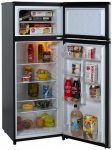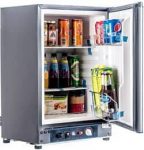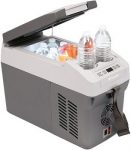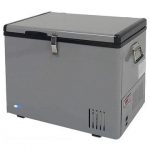When you hit the road, you need something to keep your food safe and refreshing drinks cold.
What about an RV fridge?
But choosing the one for you isn’t as easy as it seems.
A standard, the residential fridge isn’t the best choice.
You are much better off with portable and RV fridges.
Find the best one on my list and more reasons to skip residential fridges in the buying guide below.
Midea WHD-113FB1 Compact Refrigerator
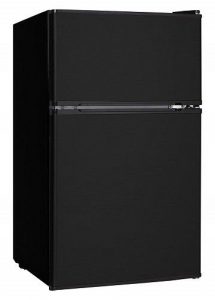
The Midea fridge has some features that are near impossible to beat.
It is a freezer/refrigerator combo, packed in a compact size that fits most RVs.
The fridge is suitable for people who park where they have AC power, so DC supply or LP gas isn’t an issue.
The doors are durable and made from stainless steel, so they will handle most bumps and vibrations.
Pros
- Excellent price
- Freezing capabilities
- Adjustable temperature range
- Reversible door hinges
Cons
- Doesn’t support defrost feature
- Works exclusively with AC power supplies
 Dylan's Take
Dylan's TakeThe fridge is quiet and has excellent interior lights.
The glass shelves and drawers are enough to hold food for your trips.
Avanti RA7316PST 2-Door Refrigerator
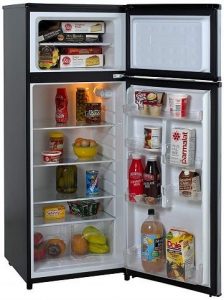
This Avanti fridge is something else.
It is a full-size fridge with a standard compressor which comes at an affordable price tag.
The fridge has excellent features such as auto-defrost and an ice-cube tray.
Also, it will work with advanced solar power generation and inverter whenever you go don’t have access to the conventional power supply.
Pros
- Large volume
- The left or right opening
- Adjustable shelves and bins
- Easy to adjust temperature
Cons
- Heavy
- Needs consistent power
 Dylan's Take
Dylan's TakeThe Avanti fridge is a great fridge for the family fridge.
It is easy to maintain due to its defrost function and can store a lot of food.
Smad 3-Way 12-Volt Refrigerator
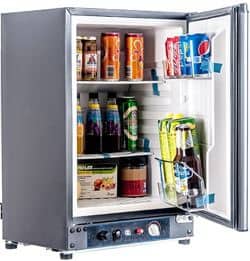
The Smad fridge is an outstanding absorption fridge, great for people who don’t need a freezer.
It runs on LP gas, AC or DC power, which is pretty impressive.
Also, it makes the fridge versatile and suitable for every RVer.
The fridge is compact and has an igniter for easy pilot lighting, as well as temperature control.
Pros
- Works on LP gas, 110V, and 12V
- Energy-efficient
- Quiet
- Adjustable shelves
- Reversible door
Cons
- Compact
- Doesn’t have freezer
- Complex vent installation required
 Dylan's Take
Dylan's TakeThe Smad fridge is compact, but it can still hold enough food for you to go off the grid for a couple of days.
The three enabled power supplies are impressive.
Dometic CDF-11 Freezer/Refrigerator
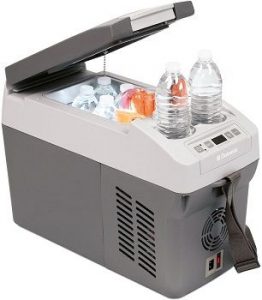
Dometic is a trustworthy brand among campers.
This refrigerator has a high-impact exterior and can withstand years of use.
It is portable, easy to store, and take with you on the trip.
You can also connect it to AC or DC power, and a solar system.
There are convenient LED indicators and a convenient control panel.
Pros
- Includes electronic thermostat
- Durable
- Two power supply options
Cons
- One compartment
- Can only work as a freezer or refrigerator at a time
 Dylan's Take
Dylan's TakeOverall, the Dometic fridge is portable and reliable.
The freezing capabilities are always desired.
Whynter FM-45G Portable Fridge
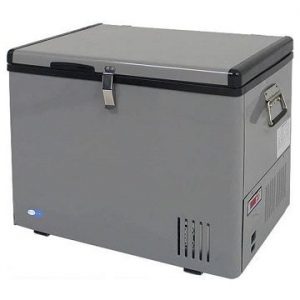
The Whynter fridge has a highly practical option for RV – fast freeze mode.
It cools down quickly to minus 6 degrees Fahrenheit.
The unit is well-built and balanced, so it can even work without issues when tilted during driving.
The fridge needs a corded power supply and supports AC or DC.
Pros
- High level of portability
- Supports freezer mode
- Powerful
- Includes wire basket
Cons
- Cannot work on LP gas
- Can work only as a freezer or fridge at a time
 Dylan's Take
Dylan's TakeThe Whynter fridge can work on an automotive battery or hook up to 110V standard outlet.
It is sturdy and will serve you for numerous RV trips.
Buying Guide
Keeping your drinks cold and food safe from spoilage is essential when going for an RV trip.
My buying guide will help you understand more about portable and RV refrigerators, so you know what you are getting for your money.
Let’s first discuss how different is the RV fridge from your standard refrigerator.
RV Fridge VS Residential Fridge
Most obviously, the RV fridge is much smaller than your at-home fridge.
It is designed to fit compact space with ease and provide access to an alternative power source.
Also, an RV fridge handles long periods of shore power when you are camping on the grid or driving for long.
Standard fridge stays in one place and doesn’t have to handle vibrations and bumps that can happen on the road.
Portable fridges have fewer moving parts and are easier to transport.
Absorption Fridge
The absorption refrigerator can cool itself without electricity with the help of burning propane.
Therefore, it is an excellent choice for the portable fridge.
The best and most expensive RV fridges support two power sources – traditional one – electric and alternative – LP propane tank.
However, the downside is that traveling with a propane fridge might not be the safest option.
RV Fridges Types
There are three types of fridges suitable for your RV.
Different factors such as size, portability, and your available space will help you choose the type for you.
Freestanding
Freestanding unit can fit narrow space.
Because it is large enough to discourage you from frequent moving, it is a great choice for campers.
It doesn’t need a water hose connection or permanent installation.
The freestanding fridge works on a plug-and-play system, and can also be used at home if you have compact space.
Refrigerator/Freezer
People who own large RVs won’t compromise comfort.
Therefore, a fridge with freezing capabilities is the best in terms of food storage.
It also gives you the freedom to freeze the food and use it after a while.
Portable Fridge
The portable fridge is an advanced model of an ice chest you would use for a day trip to the beach during summer.
It is compact and easy to use.
A portable refrigerator has electric or battery-powered compression, so it doesn’t need to be filled with ice to keep the content cold.
It is the most popular version of the RV fridge, so let’s consider some advantages and disadvantages of these units.
Pros:
- Portable
- Can work cordless
- Cools food quickly
- Resilient to bumps and harsh conditions
Cons
- Limited storage compartment
- One compartment for all food – no freezing
- Pricier
- Cannot support LP gas power installation
Can you Use Residential Fridge in RV?
There are several reasons you shouldn’t use a standard fridge in RV.
I’ll mention the most important ones.
Size
The fridge you use at home is much larger than the portable one.
It can look like an excellent option for people who travel with families.
But, first, consider if you have enough space in RV to fit a residential fridge.
Most of them won’t fit with cut-out space in your camper, so you will have to do pricey modifications.
Power Supply
Residential fridges work on 110V AC power systems.
It isn’t an issue when you park at a standard campsite and have access to an electrical box.
But, what can you do when traveling?
You will have to buy the inverter that converts the RV 12V battery to 110V.
It will consume much more power than portable units.
The solar-powered systems might not even be able to handle that much power consumption.
Durability
The standard fridge is designed to stay in one place.
Therefore, it doesn’t have protection against vibration and bumps.
So, the fridge will break down much sooner than if you used it at home.
What Can You Keep in RV Refrigerator?
If you are worried that an RV fridge isn’t what you need for your trips, let’s see what you can store in it when traveling.
An RV fridge is suitable for storing:
- Fresh fruits and vegetables
- Drinks
- Food leftovers
- Medicines or vitamins
Removing Existing Fridge in RV
Don’t be intimidated by RV fridge installation.
First, you’ll have to remove the old fridge, which is the most difficult process.
You can even hire a professional to do it for you.
But, if you want to do it yourself, here is how.
Disconnect hardware power supply, and liquid petroleum gas lines on it.
It sounds easier than it is, and the process requires preliminary steps such as closing the LP gas tank valve, which is located on the RV exterior.
You need to unplug the power supply cord and turn the generator off.
Then, unplug the alternating current power cord of the current fridge and disconnect the 12V battery from it.
Next, unscrew the screws that keep your fridge in place and ask a friend to help you remove it from RV.
Before you install a new one, check if it fits the existing cut-outs in your RV.
Installing New RV Fridge
Insert the new fridge into cut-out cabinet space and line up the gas line ports with an RV gas line hose.
If there are modifications necessary for the fridge to operate in this field, it is best to hire a professional to do them for you.
Next, connect the gas line to the fridge.
Turn on the gas supply and see if there are leaks.
If everything seems well, continue by inserting DV wires into appropriate housing.
Plug the power cord into an outlet and secure the fridge with screws and plates that came with it.
Let the fridge cool and put the food in.
Cleaning RV Fridge
Frequent cleaning of the RV fridge will prolong the fridge lifespan and reduce the food waste and prevent the dirty interior from contaminating the food.
Disinfect the handle on the fridge weekly and dispose of food that has gone bad once a week.
Every three to six months, you should do a more thorough cleaning.
Remove everything from the fridge and clean the interior with soapy water.
Wait until surfaces are dry to put the food back in.
Once a year, unplug the fridge and remove heavy build-up and inspect the coils for damage.
Never use chemicals on coils are they can be too harsh.
Things to Keep in Mind when Buying an RV Fridge
Let’s see what aspects need to cross your mind when looking for an RV fridge.
Available Space
Inspect how much space you can dedicate to the RV fridge.
You can do so by measuring the current fridge you own or find the appropriate position for it, the place where you won’t move it that often.
The Trip Length
People who do full-time RVing need to invest more money into their RV fridge, as it must handle their daily needs.
If you are an occasional RVer, you can use a portable unit.
Going with too small a fridge will cause frequent grocery shopping, a lot of food waste, etc.
Frequent Camping Space
Consider the type of camping locations where you usually park the power supply options available.
It will help you decide which models will be of the best use for you.
People who never go off-grid and always park near electrical boxes can even get away with large models and high energy consumption.
If you often go off the grid, you need something appropriate.
In that case, a small, energy-efficient fridge will be the best solution or fridge compatible with solar systems and two or three-ways power sources.
Your Fellow Campers
How many people go with you on your RV trip?
If it is only you and your partner, you can pick a small fridge to hold enough food for you.
On the other hand, if an entire family goes on a trip, you might need a combination fridge with lots of space and the option to freeze.
Your Cooking Preferences
Do you like to cook when camping or you prefer going to local restaurants to try local specialties?
If you like to cook, you’ll need more space to store ingredients.
People who don’t cook can take a small fridge that will hold only drinks, fruits, and restaurant leftovers.
Conclusion
An RV fridge can make it feel at home when you are on a trip.
It keeps the food safe, gives you an option for a healthy diet, and makes RVing easier.
There are many options on the market, so choosing the best one is a bit tricky.
Determine your needs and the appropriate size of the fridge.
But, choose the power supply option wisely as it will determine the usability of your fridge.
Have you tried any of the models from my list?
Best Overall Choice
Midea WHD-113FB1 Compact Refrigerator
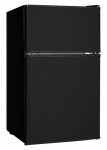
We're a team of professional travelers, on-the-go freelancers, web producers, writers and editors. Our mission is to pick the best travel gear by analyzing customer opinions and writing our own findings to help you find the right products for you. Please share our posts to help us grow. Read more...
